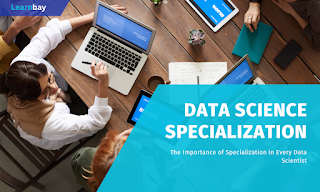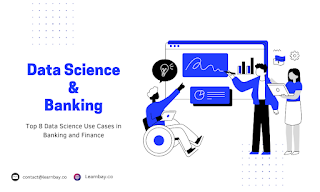The Importance of Specialization in Every Data Scientist
According to projections, there will be no employment for data scientists in the upcoming ten years since businesses have learned hard lessons and the bubble surrounding data science job titles is collapsing. When hiring personnel, they prioritize particular skill sets rather than generality. Organizations will continue to be impacted by data science, but not in a broad way.
Companies’' new recruiting procedures mandate that candidates be evaluated on their technical skills rather than their job titles. Big data, cloud computing, machine learning, and artificial intelligence (AI) are some of the cutting-edge technologies luring the most investment. Thus, specialization is the way of the future, even though data science is more crucial than ever.
Changes in Data Science's Role
The best course of action in data science is not to become a jack of all trades. It is advised that you hone your abilities for a certain trade while seeking careers in data science. You may train to be a data engineer, machine learning engineer, BI developer, or data analyst, for instance.
Education and curriculum in data science are now more widely available than ever. Aspiring data science students may learn the fundamentals in these courses, like Learnbay’s online data science course in Bangalore. Students must use this basic education as a stepping stone before diving further into a subject area and choosing a specialty.
According to market trends, data scientists specializing in a certain field, such as database administration, artificial intelligence, or machine learning, are in high demand. Not only can specialization increase your income, but it also gives you the ability to take on tasks with greater personal importance.
Data science provides a variety of alternatives, unlike other professions with slow potential for growth, where you must stay abreast of market changes to be competitive.
Primary Factors Affecting the Data Science Role
The function of the modern data scientist is significantly changing due to the following considerations.
Rise of Data
Several organizations and sectors have been changed by the proliferation of AI and ML-based apps and algorithms. IoT gadgets are also incorporated into smart industries and smart homes; however, domestic users still heavily rely on social media. The spread of all these technologies is anticipated to produce vast volumes of data.
Sadly, there aren't enough resources to meet the need for data. According to Gemalto's research, 65 percent of businesses said they couldn't categorize or evaluate their stored data.
New Data Security Standards and Regulations
Companies must abide by a number of rules when it comes to the storage and processing of data now that the General Data Protection Regulation (GDPR) has been put into effect by the European Union. Data scientists are establishing strict data security rules to satisfy this demand.
Organizations need data scientists to help them integrate their data with business operations to stay current with these constantly changing privacy requirements. California adopted a data privacy law that is remarkably comparable to the GDPR on January 1, 2020, following the EU's lead. The demand for data science capabilities is predicted to rise as a result of this occurrence.
Personalized Products and Services
Data science specialization is increasing as a result of the ability of businesses to extract pertinent data insights. For instance, a business may utilize machine learning algorithms to offer products to clients based on their age, gender, preferences, and other characteristics. They can also use business intelligence (BI) to determine which services cost the organization money.
Real-Time Analytics
Data science's abilities are also changing due to real-time analytics. Only seasoned data scientists with particular skill sets can handle data from several sources, especially when it is dynamic. Additionally, how firms may manage data analytics job roles is impacted by the demand for analytics governance and higher-quality data.
Advancement of AI, Machine Learning, Cloud computing, and Edge computing
The importance of data science has significantly expanded with the development of technologies like AI, deep learning, machine learning, and related applications (such as chatbots and robotic process automation). Today, many businesses are adopting AI and machine learning. It implies that all industries will utilize AI-related tools and expertise.
A data science method is fundamentally one of repetition, input from various skill sets, and professional involvement. Companies now aim to quicken the process and make it more precise so that it is less arbitrary and predictable. They want to continually improve the data science procedures, which calls for the necessary expertise.
Teams in Data Science Have Evolved
Data science teams' dynamics have changed for the better. Companies may now hire specialists with specific expertise to add value since, unlike before, they are aware of the advantages that data science can provide them.
Specialization in skills translates to both career development and business requirements.
The benefits of having specialized data science abilities include the following:
Identify and resolve internal and business obstacles
Use AI to increase creativity flexibility
Be the engine that propels your career forward
The following are examples of how to demonstrate this:
Professional advancement: Using cutting-edge technology makes cooperation easier and increases productivity. Real-world experience can help you develop domain competence over time, especially if your everyday data science work involves paying close attention to various specialized activities.
Business Requirements: Help companies build strong corporate business skills and improve data science processes.
Data Science Specialization Types
Data scientists prefer to target small programs that focus on a specific skill set rather than long, generic ones. Data analysis, database administration, machine learning, deep learning, big data, neural networks, Python, statistical analysis, and solution architecture are a few of these fields. For instance, research on machine learning found that about 45% of developers wish to learn more about it or improve their knowledge of the subject.
The mastery of these specialties will lead to the creation of jobs for data scientists, AI experts, cloud engineers, and program managers, among others. The way firms seek specific skill sets will be impacted by this. The function of data scientists will eventually shift irrevocably.
Conclusion
Rapid growth is occurring in technologies, enterprises, sectors, and customer expectations. In order to meet demands connected to both the talent structure and developing technology, organizations must strike the correct balance. Data scientists will be in huge demand in the coming years. Thus, you must keep learning continuously to stay updated with the current trends and technologies. Check out the latest data science Course in Pune, to gain profound knowledge of tools and techniques used in multiple industries.




Comments
Post a Comment